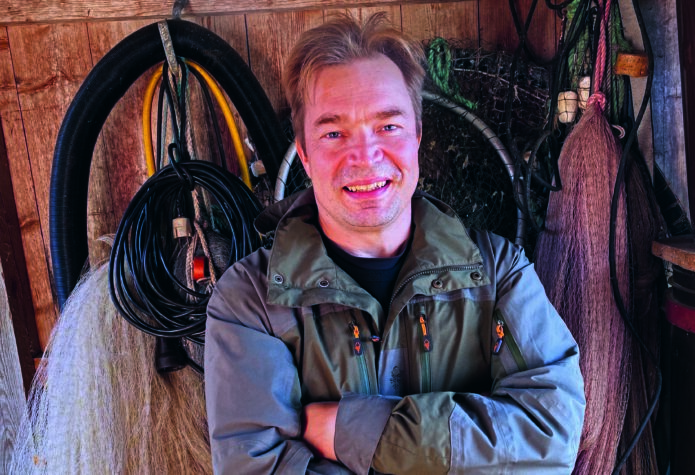Fisherman’s blues on the Baltic Sea

By Jukka Ahonen, Head of Communications at the Nordic Investment Bank.
It’s freedom.
This is the answer I hear over and over again when I ask coastal fishermen around the Baltic Sea what the best thing has been about their profession.
Most of them are grey-haired and male. Many have been fishermen for generations. What are their first memories of fishing? Standard answer: Oh, my grandfather took me to sea when I was a kid.
But now the fisherman’s blues on the Baltic Sea is getting more melancholic. We see more and more old men in their boats taking up their nets for the last time. And children are no longer interested in continuing the ancient profession of their fathers.
Coastal fishermen around the Baltic Sea are struggling. Freedom has become a nostalgic memory of the past. Today, commercial fishing is heavily regulated and rightly so. However, new rules, restrictions and paperwork cause headache for fishermen who feel that they have become victims of bureaucracy.
When talking with Baltic Sea fishermen, one quickly touches upon the very fundamental questions of life. In more academic circles, there is often a distinction between economic, social and environmental aspects of sustainability. Baltic Sea fishing is also a balancing act between all these elements.
First of all, these fishermen literally make their living from the sea, which is why all the necessary investments, the vessels and the equipment, must bring some economic return. Fishing is a tough profession and depends on the weather. Furthermore, fishing is not only highly regulated, but also other sea hunters, such as seals, are after the same catch. Some coastal fishermen complain that big trawlers empty the waters, so if there are no fish, it’s better to stay in the harbour. Yet, there also needs to be a market for the fish. And while public authorities recommend we eat fish, they also warn about environmental toxins. So, it’s not surprising that the number of coastal fishermen is declining year after year.
Secondly, fishing is a way of life. In particular, coastal fishermen see their job as a continuation of a family tradition which dates back hundreds of years. One fisherman in Denmark had tears in his eyes when he saw his son’s fishing vessel next to his, while a Polish fisherman was proud to show off the registration number – the same as his grandfather’s – on his fishing boat. As fishing is a way of life, it is very hard to start doing something else for a living. Fishing is your entire life.
Third, nature sets the boundaries for the profession. The Baltic Sea provides a notorious example of the human impact on the marine ecosystem. With an average depth of only 54 meters, the sea is very vulnerable. In comparison, the average depth of the Mediterranean Sea is around 1,500 metres. The shallow waters of the Baltic Sea are surrounded by nine industrial nations, the result of which is that the sea is one of the most polluted in the world. Eutrophication is the biggest environmental problem in the Baltic Sea. One visible example of this is the formation of blooming blue-green algae every summer. The seabed has large dead zones due to poor oxygen conditions. Climate change is only making the problem worse.
The poor ecological state of the Baltic Sea is also affecting the fish stocks. Although fishermen tend to point to seals and cormorants for declining stocks, overfishing has also contributed to their misery. The situation is most alarming with cod. In fact, this year all direct cod fishing in the Baltic Sea is banned as the species is under existential threat.
For most of their history, humans lived at the mercy of nature. Yet, now Homo sapiens seems to be no longer part of nature but a dominant species with a huge environmental footprint. The Baltic Sea is a perfect example of this. As we have caused the problem we should also fix it. Today, experts are defining how much fish can be taken out of the sea while politicians make the final decisions of the quotas. In fact, we have come to a situation that we need to protect the Baltic Sea from ourselves.
Fortunately, there is also a light at the end of the tunnel: marine pollution has been sharply reduced over recent decades due to determined action by the surrounding Baltic Sea states. Although the clean-up process will take a long time due to the sins of the past, the positive direction is encouraging. Fishermen and consumers can also do their part. One ecological action would be to start catching and consuming more cyprinids such as roach or bream which are abundant in the Baltic Sea. This measure would also reduce the eutrophication as phosphorous would be removed from the sea.
The marine environment sets the boundaries for fishing and finally determines the destiny of coastal fishermen. If there are no fish, the fishing vessels will stay in the harbours, inactive till they end up being demolished. Sustainable fishing and a cleaner Baltic Sea are preconditions for the healthy development of fish stocks. When all this is ensured, we will also see future generations of coastal fisher taking their vessels to sea at dawn.
Jukka Ahonen has recently written a reportage book on commercial fishing in the Baltic Sea. (Jukka Ahonen, Janne Sundell, Pekka Turunen: Kalastajien kyydissä Itämerellä, Med fiskebåt på Östersjön, John Nurminen Foundation, 2022)
Did you find the article interesting? Subscribe to our newsletter below for similar stories.